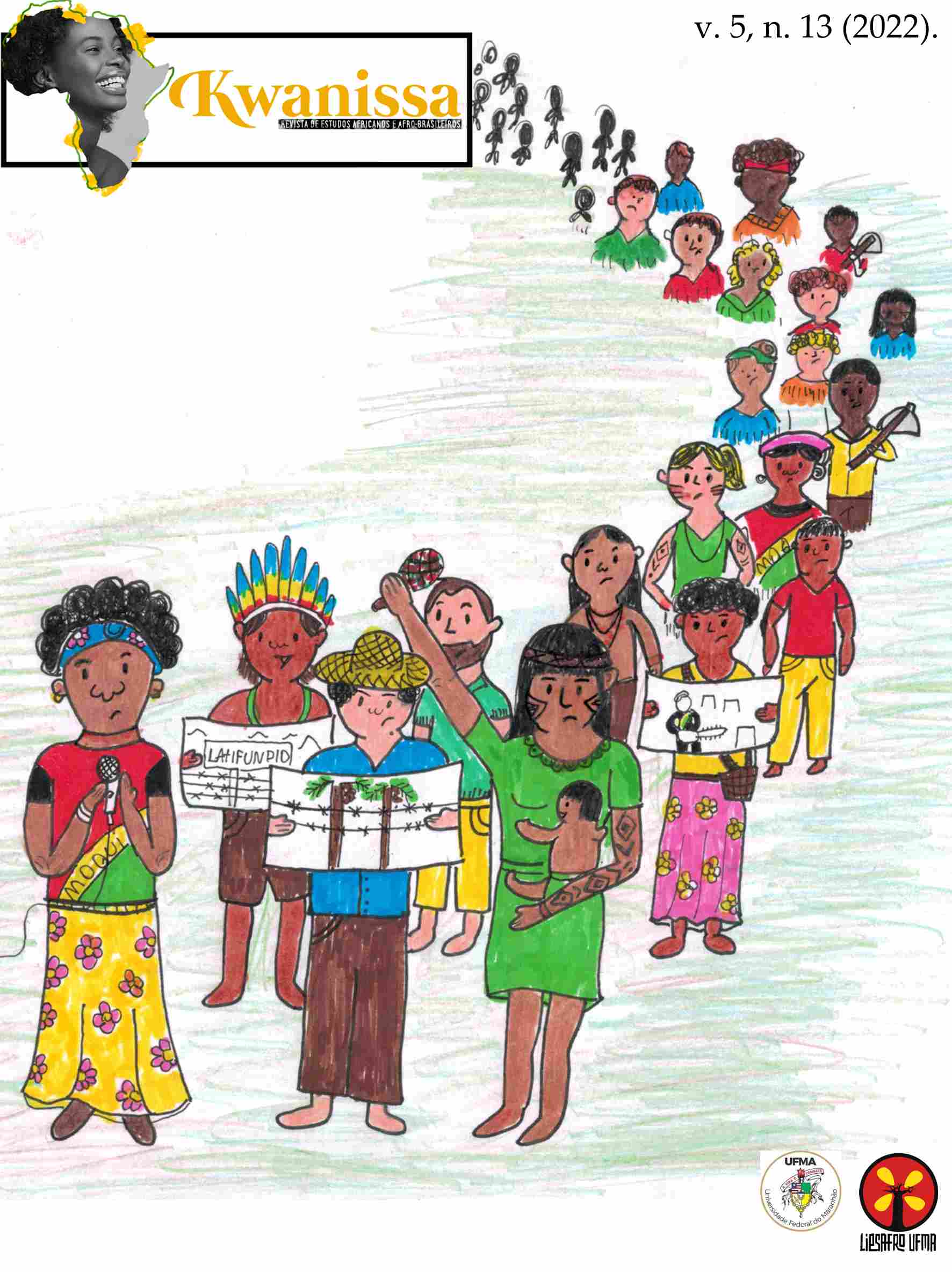FEMINISTAS NEGRAS INFLUENCERS DIGITAL
Empoderamento feminino negro
DOI:
https://doi.org/10.18764/2595-1033v5n13.2022.36Palavras-chave:
Empoderamento negro, feminismo negro, influencer digitalResumo
O movimento feminista se constitui a partir da busca de mulheres por aquisição de direitos como voto, trabalho e educação. Inicialmente, o movimento feminista não levava em consideração as questões ético-racial. Nesse sentido, o discurso de Sojourner Truth foi de grande importância para o movimento feminista negro. O movimento feminista alcançou a rede através de sites, blogs, canais do YouTube, perfis em redes sociais tanto por perfis pessoais de feministas como de perfil de conteúdo feminista. Desse modo, objetivamos analisar como a presença de mulheres feministas negras Influencer digital tem favorecido a desconstrução dos estereótipos criados acerca do movimento, bem como identificar se representa um estímulo à construção da identidade e valorização da mulher negra e discutir como as Influencer digitais negras enfrentam as críticas e combatem o racismo na rede. O trabalho é uma pesquisa bibliográfica, qualitativa e descritiva. Djamila Ribeiro, Taís Araújo, Nátaly Neri e Gabi Oliveira foram vítimas de ataques racistas nas redes sociais. A partir dos comentários das seguidoras e demais internautas se observa como as influencers digital negras e feministas utilizam sua voz na internet para discutir questões sobre etnia e gênero tem gerando identificação e apoia entre as mulheres nessas redes socias.
Downloads
Referências
ABRANTES, Elizabeth Sousa; JUNIOR, Reinaldo dos Santos Barroso. O Maranhão e a escravidão Moderna. Eduema. São Luís, 2016.
BEAUVOIR, Simone de. O Segundo sexo. Rio de Janeiro, 2 ed. Nova Fronteira, 2009.
BRASIL. Decreto-lei nº 2.849, de 7 de dezembro de 1940. Senado Federal. Brasília. 1940.
BRASIL. Lei nº 7.716, de 5 de janeiro de 1989. Senado Federal. Brasília, 1989.
CARVALHO, Cristiane Portela de. A contribuição da identidade feminina em veja. dissertação. Universidade Federal de Pernambuco, Programa de pós-graduação em comunicação. Recife. 2006.
FERREIRA, Ricardo Frankllin e CARMAGO, Amilton Carlos. As relações cotidianas e a construção da identidade negra. Psicol. cienc. prof. vol.31 no.2 Brasília , 2011.
G1. Atriz Taís Araújo é alvo de comentários racistas em rede social. G1. Rio de Janeiro. 2016.
Disponível em http://g1.globo.com/rio-de-janeiro/noticia/2015/11/atriz-tais-araujo-e-alvo-de-comentarios-racistas-em-rede-social.html Acesso em 16 de agosto de 2020.
HALL, Stuart. A identidade cultural na pós-modernidade. Tradução: TomásTadeu da Silva e Guaraciara Lopes Louro.ed.11, DP&A, Rio de Janeiro. 2006.
JONES, Lucas e SIMÕES, Hanna. Análise semiótica dos discursos de Sojourner Truth.Anais do Congresso Nacional Universidade, EAD e Software Livre. v. 2, n. 8 Minas Gerais. 2017.
MARIE CLAIRE. 8 Influenciadoras de beleza negra para inspirar já. Marie Claire. 2020. Disponível em https://revistamarieclaire.globo.com/Beleza/noticia/2020/01/8-influenciadoras-de-beleza-negra-para-inspirar-ja.html Acesso em 15 de agosto de 2020.
MENDONÇA, Tatiana. Djamila Ribeiro: "Não dá para tratar as opressões de forma isolada". A Tarde. Salvador. 2019. Disponível em https://www.atarde.uol.com.br/muito/noticias/2053243-djamila-ribeiro-nao-da-para-tratar-as-opressoes-de-forma-isolada Acesso em 31 de agosto de 2020.
MIZAEL, Náiade Cristina de Oliveira e GONÇALVES, Luciane Ribeiro Dias. Construção da identidade negra na sala de aula: passando por bruxa negra e de preto fudido a pretinho no poder. Revista Eletrônica de Educação, v. 9, n. 2, p. 615-636, 2015.
MINISTÉRIO PÚBLICO DO DISTRITO FEDERAL. Mês da consciência Negra: MPDFT identifica crescimento dos crimes de ódio na internet. Ministério Público do Distrito Federal e territórios. Brasilia. 2019. Disponível: https://www.mpdft.mp.br/portal/index.php/comunicacao-menu/sala-de-imprensa/noticias/noticias-2019/11426-mes-da-consciencia-negra-mpdft-identifica-crescimento-expressivo-dos-crimes-de-odio-em-ambiente-virtual Acesso em 28 de agos. de 2020.
SILVA, Maria Clara. Representatividade na internet: 50 blogueira negras para você seguir. Mundo Negro. 2020. Disponível em https://mundonegro.inf.br/representatividade-na-internet-50-blogueiras-negras-para-voce-seguir/ Acesso em 31 de agosto de 2020.
RIBEIRO, Djamila. O que é lugar de fala?. Belo Horizonte: Letramento, 2017.
RIBEIRO, Djamila. Quem tem medo do feminismo negro?. São Paulo: Companhia das Letras, 2018.
SILVA, Pâmela Ferreira da. Feminismo nas rede sociais: Análise das hostilidade sofridas pelas feministas Dolores Aranovich e Madge Porto. Revista Tropos, ISSN: 2358-212X, volume 6, número 1, ed. de Jul. de 2017.
PINTO, Céli Regina Jardim. Feminismo, história e poder. Rev. Sociol. Polít., Curitiba, v. 18, n. 36, p. 15-23, jun. 2010.
TEDx. Precisamos romper com os silêncios. Palestra de Djamila Ribeiro. TEDx São Paulo Salon, TEDxTalks. 27 de jan. de 2017. 10m01s. Disponível em:https://www.youtube.com/watch?v=6JEdZQUmdbc. Acesso em 30 de agosto de 2020.
TEDx. Como criar crianças doces num país ácido. Palestra de Taís Araújo. TEDx São Paulo, TEDxTalks. 14 de nov. de 2017. 10m24s. Disponível em: https://www.youtube.com/watch?v=H2Io3y98FV4. Acesso em 29 de agosto de 2020.
OROSCO, Dolores. Guru feminista. Universa Uol. Uol.São Paulo. 2017. Disponível em: https://www.uol/estilo/especiais/djamila-ribeiro.htm Acesso em 13 de agosto de 2020.
UOL.Twitter lucra com exploração de racismo e misoginia, diz Djamila Ribeiro. UOL. São Paulo. 2020. Disponível em: https://www.uol.com.br/tilt/noticias/redacao/2020/08/14/twitter-lucra-com-exploracao-de-racismo-e-misoginia-diz-djamila-ribeiro.htm Acesso em 15 de agosto de 2020.
Downloads
Publicado
Como Citar
Edição
Seção
Licença
Copyright (c) 2022 Kwanissa: Revista de Estudos Africanos e Afro-Brasileiros

Este trabalho está licenciado sob uma licença Creative Commons Attribution-NonCommercial 4.0 International License.
Direitos autorais Kwanissa: Revista de Estudos Africanos e Afro-Brasileiros
Este obra está licenciado com uma Licença Creative Commons Atribuição-NãoComercial-SemDerivações 4.0 Internacional.











